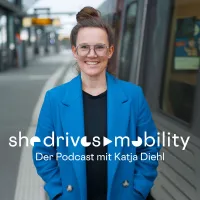Episode Description
In my new episode of *she drives mobility*, I spoke with Ed Niedermeyer – author of the book *Ludicrous: The Unvarnished Story of Tesla Motors* and co-host of the podcast *Autonocast*. Our discussion revolved around Tesla, autonomous driving and the fundamental question:
How do we want to be mobile in the future?
If you like this episode, put some stars on it or send it to someone who should listen to it. I make this all pro bono, but feel free to support me per Ko-Fi oder PayPal. My weekly german newsletter can be subscribed here steady. My english blog is hosted at Medium. I work as a keynote speaker, panelist and author. Feel free to contact me!
**Tesla: progress that isn’t progress at all**
Ed impressively explained to me how Tesla has managed to squeeze new technologies such as the electric drive into an old, familiar product – the American car – in such a way that hardly anything changes. Long range, big battery, big car. The illusion of the future without people having to question their behavior. And that is precisely the problem.
“Tesla sells us the old as something new – and people love it because they don’t have to change anything.”
I also often see that we in Germany – especially in the automotive industry – still think too much in traditional patterns. Instead of seizing the opportunities for real transformation, we cling to what has gone before. And still praise Elon Musk as a visionary, even though he is blocking precisely this change.

**Electric cars are not automatically climate-friendly**
Ed has raised an important point: The way we talk about e-mobility is preventing the transportation transition. If range is everything, we need huge batteries. And then e-cars are only for the rich. The real potential of electromobility lies in small, lightweight vehicles for short distances. And yes – maybe even an e-bike or a scooter.
“The average trip in the USA is six miles long – why do we need 300 miles of range?”
I also often ask myself why we don’t manage to align mobility with real needs. Why do we still define freedom in terms of ownership – instead of shared, accessible and needs-based offers?

**Autonomous driving: Wishful thinking with side effects**
Another topic was Tesla’s promise of “Full Self Driving”. For years, customers have been led to believe that their cars would soon drive themselves. But the technology still doesn’t deliver. On the contrary: it brings with it new risks because drivers rely too much on the system – and react too slowly in an emergency.
“Autopilot sounds like control, but in reality it makes us worse drivers.”

I am convinced that autonomous driving can make sense – but not in a private car in the middle of the city center. I see much more potential in rural areas, for on-demand services or shared fleets. But this presupposes that we finally stop seeing the car as the universal solution to all mobility issues.
**How technology is changing our view of mobility**
What I appreciate about Ed’s work: He doesn’t oppose technology – but he demands that we finally see it for what it is: a tool. And not a promise of salvation. We have to ask ourselves: does this technology serve people – or do we serve it?
“We have to learn again that technology should support us – not the other way around.”

I too would like to see more urban spaces for people – not for parked cars. I dream of cities where we don’t have to take a “vacation from the car”, but where car-free living is part of everyday life. And I know that there are no easy solutions. But it starts with the question: How do we really want to live?
**My conclusion: we are not too small to make a difference**
I know how often people say to me: “What am I supposed to change?” Or how often people who have visions are ridiculed. But that’s exactly what drives me at *she drives mobility*: To show people that they are not alone – and that change is possible if we have the courage to think differently.
“Change begins in the mind – and with the willingness to ask questions.”
Thank you, Ed, for this honest, intelligent and inspiring conversation. And thank you to everyone who listened, thought and joined in the discussion. We need these voices more than ever.
